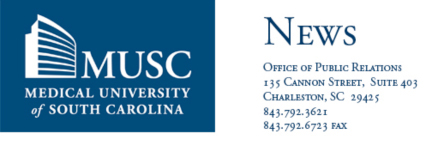
Aug. 27, 2010
CHARLESTON -- An estimated 3.2 million Americans suffer from treatment-resistant depression (TRD), but very few have received effective treatment. Ziad Nahas, M.D., Medical University of South Carolina (MUSC) associate professor, is one of 42 researchers from a pool of 217 awarded a NARSAD 2010 Independent Investigator grant for research on treatment-resistant depression.
Nahas will receive $100,000 for his research project entitled, "Bilateral Epidural Prefrontal Cortical Stimulation (EpCS) for Treatment-Resistant Depression." Nahas has obtained preliminary data in open-treatment settings showing that bilateral epidural prefrontal cortical stimulation (EpCS) is effective in relieving severe TRD in five patients. The goal of the proposed project is to extend this line of clinical research in patients with TRD and collect more data with EpCS under blind conditions.
"This yearís applicants brought forward exceptional and diverse proposals that will lead to significant discoveries in the field of psychiatry," said Robert M. Post, M.D., a member of the Scientific Council and chair of the committee that selected the 2010 Independent Investigators. The committee identified those proposals they believed demonstrated the most innovative and promising paths toward better understanding and treatment of psychiatric disorders.
"Cortical stimulation has several advantages provided that it shows efficacy in treating depression," said Nahas. "It is reversible, non-destructive and potentially safer than other forms of invasive brain stimulation since the stimulating paddles donít come in direct contact with the brain. NARSADís confidence in our team and approach is a token of its relentless effort to continue the search for effective treatments to this disabling disease."
About MUSC
Founded in 1824 in Charleston, The Medical University of South Carolina is the oldest medical school in the South. Today, MUSC continues the tradition of excellence in education, research, and patient care. MUSC educates and trains more than 3,000 students and residents, and has nearly 11,000 employees, including 1,500 faculty members. As the largest non-federal employer in Charleston, the university and its affiliates have collective annual budgets in excess of $1.7 billion. MUSC operates a 750-bed medical center, which includes a nationally recognized Children's Hospital, the Ashley River Tower (cardiovascular, digestive disease, and surgical oncology), and a leading Institute of Psychiatry. For more information on academic information or clinical services, visit www.musc.edu or www.muschealth.com.
#####